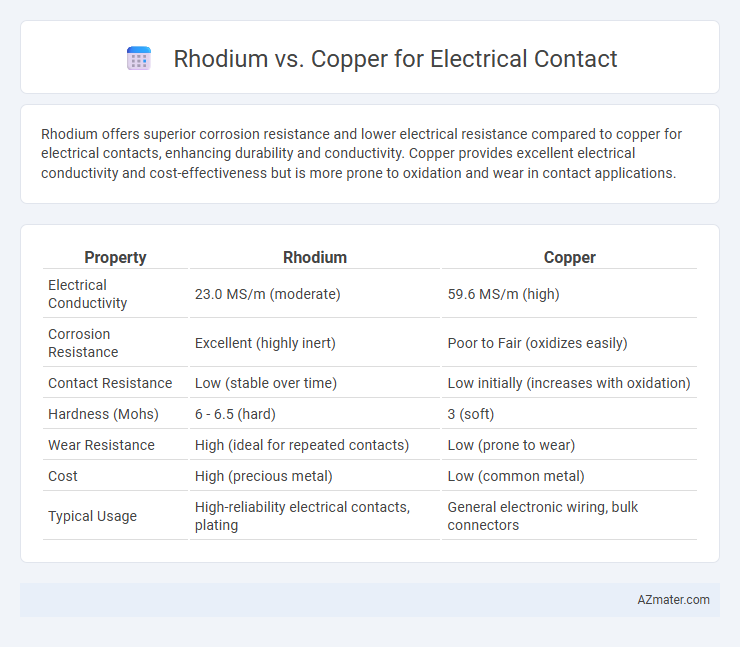Rhodium offers superior corrosion resistance and lower electrical resistance compared to copper for electrical contacts, enhancing durability and conductivity. Copper provides excellent electrical conductivity and cost-effectiveness but is more prone to oxidation and wear in contact applications.
Table of Comparison
| Property | Rhodium | Copper |
|---|---|---|
| Electrical Conductivity | 23.0 MS/m (moderate) | 59.6 MS/m (high) |
| Corrosion Resistance | Excellent (highly inert) | Poor to Fair (oxidizes easily) |
| Contact Resistance | Low (stable over time) | Low initially (increases with oxidation) |
| Hardness (Mohs) | 6 - 6.5 (hard) | 3 (soft) |
| Wear Resistance | High (ideal for repeated contacts) | Low (prone to wear) |
| Cost | High (precious metal) | Low (common metal) |
| Typical Usage | High-reliability electrical contacts, plating | General electronic wiring, bulk connectors |
Introduction to Rhodium and Copper in Electrical Contacts
Rhodium offers exceptional corrosion resistance and high conductivity, making it ideal for electrical contacts that demand durability and minimal signal loss. Copper is widely used due to its excellent electrical conductivity and cost-effectiveness, but it requires protective coatings to enhance wear resistance and prevent oxidation. In electrical components, rhodium's superior hardness and chemical stability often complement copper's properties, optimizing performance and longevity.
Electrical Conductivity: Rhodium vs Copper
Copper exhibits superior electrical conductivity, approximately 5.96 x 10^7 S/m at room temperature, making it the preferred choice for electrical contacts requiring minimal resistance and optimal current flow. Rhodium, with a conductivity near 2.2 x 10^7 S/m, offers moderate conductivity but excels in corrosion resistance and durability, which is crucial for maintaining long-term contact reliability. The trade-off between copper's higher electrical conductivity and rhodium's enhanced wear resistance influences material selection in high-performance electrical contact applications.
Corrosion Resistance Comparison
Rhodium exhibits superior corrosion resistance compared to copper in electrical contacts, maintaining conductivity and structural integrity even in harsh environments. Copper tends to oxidize and form surface oxides that increase contact resistance and degrade performance over time. Rhodium's inertness and exceptional resistance to tarnishing ensure long-lasting, reliable electrical connections in high-demand applications.
Mechanical Durability and Wear Performance
Rhodium offers superior mechanical durability and wear resistance compared to copper, making it ideal for high-cycle electrical contacts subject to frequent engagement and disengagement. Its high hardness and corrosion resistance reduce material degradation and contact resistance over time, ensuring reliable conductivity and extended service life. Copper, while having excellent electrical conductivity, is softer and more prone to wear and deformation under mechanical stress, limiting its effectiveness in demanding contact applications.
Cost Analysis: Rhodium vs Copper
Rhodium offers excellent corrosion resistance and low contact resistance, but its high market price--often exceeding $10,000 per ounce--makes it a costly material for electrical contacts compared to copper. Copper provides superior electrical conductivity and affordability, with prices around $4 per pound, making it the preferred choice for cost-sensitive applications. When analyzing total cost of ownership, rhodium's durability reduces maintenance expenses, but copper remains dominant due to its balance of cost-efficiency and performance in standard electrical contacts.
Thermal Stability and Heat Conductivity
Rhodium exhibits superior thermal stability compared to copper, maintaining its structural integrity and electrical performance at temperatures exceeding 1,000degC, whereas copper's thermal stability significantly decreases above 400degC. Copper outperforms rhodium in heat conductivity with a thermal conductivity of approximately 401 W/m*K, facilitating efficient heat dissipation during electrical operation. Rhodium's enhanced oxidation resistance and lower thermal expansion make it favorable for high-temperature electrical contacts, despite copper's advantage in heat conduction.
Common Applications in Electrical Systems
Rhodium offers superior corrosion resistance and higher electrical conductivity compared to copper, making it ideal for high-reliability electrical contacts in aerospace and telecommunications equipment. Copper's excellent conductivity and cost-effectiveness make it prevalent in everyday electrical wiring, circuit boards, and automotive connectors. Rhodium's durability under extreme environmental conditions supports its use in precision switches and high-frequency connectors, whereas copper remains dominant in power transmission and general electrical distribution systems.
Maintenance and Lifespan Considerations
Rhodium offers superior corrosion resistance and maintains stable electrical conductivity over extended periods, reducing maintenance frequency compared to copper contacts that are prone to oxidation and wear. The high durability of rhodium plating extends the lifespan of electrical contacts, minimizing replacement costs and downtime in critical applications. Copper contacts require regular cleaning and monitoring to prevent performance degradation, whereas rhodium's resilience ensures consistent functionality with less intensive maintenance.
Environmental Impact and Sustainability
Rhodium offers superior corrosion resistance and longevity compared to copper, reducing the need for frequent replacements and minimizing electronic waste. Copper, while more abundant and easier to recycle, involves energy-intensive mining processes that contribute to significant carbon emissions and environmental degradation. Selecting rhodium-plated contacts enhances sustainability in high-performance applications by extending device lifespan and reducing the overall ecological footprint despite its rarity.
Choosing the Right Material for Electrical Contacts
Rhodium offers superior corrosion resistance and higher electrical conductivity compared to copper, making it ideal for high-performance, low-voltage electrical contacts in harsh environments. Copper provides excellent electrical conductivity and is cost-effective but lacks the hardness and durability of rhodium, often requiring protective coatings to prevent oxidation. Selecting the right material depends on balancing conductivity, durability, environmental conditions, and budget constraints for the specific electrical contact application.

Infographic: Rhodium vs Copper for Electrical Contact
 azmater.com
azmater.com